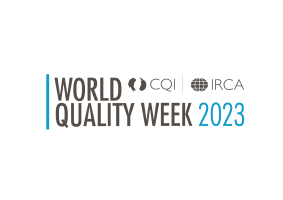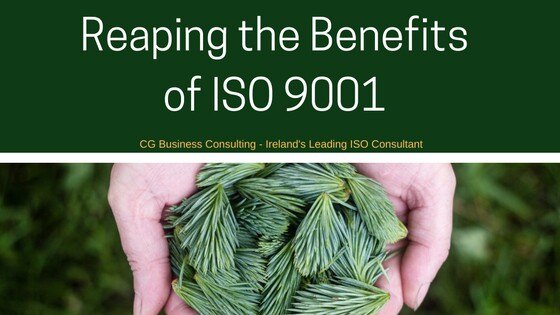Quality ISO? You Pay for What You Get! ISO 9001
You get nothing for nothing these days, most especially quality, which at the best of times comes neither cheaply nor easily.
9 min read
Caroline Geoghegan : Nov 7, 2023 10:00:59 PM


This year's World Quality Week theme "Realising Your Competitive Potential," strikes a chord with us at CGBC. We firmly believe that nothing epitomises potential more than customer satisfaction. Let's be frank – without it, there's no business, and certainly no competitive edge.
https://www.youtube.com/watch?v=K4lAT-sFa3o
In today’s ever-changing world, no two things define the relationship between customer and business more than Quality and Sustainability. Every day, news programs bring us stories about new sustainable developments, infrastructure projects and changes to our roads, buildings, transport routes and utilities. What they don’t bring us is stories on how Quality and the alignment with ISO 9001 is the ultimate catalyst for business success, offering competitive advantage, and operational excellence.
In a world that's constantly evolving, the dynamics between businesses and their customers are more intricate than ever before. In the era of "Consumer" value for money is the core principle that customers hold dear. It's no longer just about quantity; it's about quality. The bar for customer expectations has never been set higher, demanding that organisations consistently deliver high-quality goods and services.
We've sung the praises of Quality's transformative power before. It's the secret sauce for businesses aspiring to conquer uncharted markets and scale new summits. ISO 9001: 2015, a beacon of Quality offers concepts, methods, processes, and tools that allow organisations to infuse excellence and value into their products and services. The result? The ability to not only meet but exceed customer expectations.
Mistakes can be costly, both financially and in terms of reputation. Recent research by the Chartered Quality Institute (CQI) revealed that basic mistakes account for around 20% of an organization's direct costs. Quality defects, substandard products or services, and customer dissatisfaction can tarnish a company's image and affect its profitability. Ineffectual operations can harm productivity, environmental impact, and stakeholder health and safety. A robust QMS (ISO 9001: 2015) can mitigate these risks and ensure a smooth operational environment.
ISO 9001 provides a structured framework that streamlines processes, reduces inefficiencies, and minimises costly mistakes. Your operations become more agile and responsive.
"Inefficiency" is the arch-nemesis of success. When Quality takes the reins, inefficiencies are minimised. Rather than firefighting, organisations see problems before they occur and have a well-laid framework to circumvent disaster. This frees them to pursue their financial and strategic goals, unburdened by operational chaos.
ISO 9001, with its emphasis on continuous improvement, isn't a one-time achievement but an ongoing journey. It encourages organisations to become learning organisations, always seeking ways to refine their processes, deliver better quality, and provide greater value to their customers. This means your organisation is always evolving and striving for excellence, which is vital in today's competitive landscape.
ISO 9001 promotes cross-functional collaboration, leading to smoother workflows and higher quality outputs. This structured, systemic approach sets the stage for growth and innovation.
“Realising your Competitive Potential”
Instead of focusing on problem resolution, organisations that view Quality as a strategic tool for success, already have a process-driven, risk-based framework in place to mitigate against failure, freeing them up to focus on achieving financial and business goals.
Quality drives capability, and capability is the bedrock of optimal performance which in turn results in product and service excellence. Ipso facto, ‘Happy Customers’.
If we don’t learn from our mistakes, we will never achieve success. Viewing customer reaction as an education in how to run a business is fundamental to making the changes we need to drive the efficiency and continuous improvement required to achieve business success.
“Your most unhappy customers are your greatest source of learning” - Bill Gates
By taking a customer-centric approach to building a Quality-based culture, organisations can deliver value for customers which in turn will yield them business growth, enhanced reputation and that holy grail of all aspiring market leaders, optimal levels of customer satisfaction.
Happy customers are satisfied customers, and “satisfied customers are the best business strategy of all.” - Michael Le Boeuf, author “The Perfect Business”.
CG Business Consulting’s expert Quality Consultants will work closely with you and your team to establish a robust ISO-based framework for operational excellence that will support everyone across the organisation to actively work towards continuous improvement and future-facing innovation.
Your dedicated CGBC consultant will partner with you to build and adapt an integrated system which will help your employees from across all areas of your business to work collectively to inject quality into everything they do, make or deliver, ensuring your organisation achieves customer service excellence.
For more information on how ISO 9001 can help transform your business and achieve high levels of customer satisfaction.
You can find out more about World Quality Week by visiting the CQI website.
#WorldQualityWeek
Quality: realising your competitive potential
Date: 6-10 November 2023.
A management system is a way of defining an organisation’s operations to help it meet its objectives. ISO 9001 is a quality management system.
A quality management system is a way of defining how an organisation can meet the requirements of its customers and other stakeholders affected by its work. Other ISO standards look at other types of management systems, such as ISO 14001 for environmental management or the upcoming ISO 45001 for occupational health and safety management. ISO 9001 is based on the idea of continual improvement. It is designed to be flexible enough for use by many different types of organisation, so does not specify what the objectives relating to “quality” or “meeting customer needs” should be.
Instead, it requires organisations to define these objectives themselves and continually improve their processes in order to reach them. Once these targets have been attained, they must be reassessed in a quest for continual improvement. A good quality management system can bring benefits to organisations of all sizes and all sectors, from the small manufacturer of bicycle parts to a hospital employing 5000 people. In fact, when ISO 9001:2015 was revised, one of the main improvements was to make it accessible to all types of enterprises, including service oriented organisations.
Implementing a quality management system will help you:
Work in a more efficient way as all your processes will be aligned and understood by everyone in the business or organisation. This increases productivity and efficiency, bringing internal costs down.
Certification to ISO 9001 is not a requirement and you can use the standard to improve the way you work without being certified. However, third-party certification – when an independent certification body audits your practices against the requirements of the standard – is a way of signalling to your buyers, customers, suppliers and other stakeholders that you have implemented the standard properly. For some companies, however, third-party certification may be a requirement.
For example, some governments or public bodies may only contract suppliers that have been certified to ISO 9001. Although we develop and publish the standard, ISO does not perform certification. For more information about the certification process and how to find a certification body, see our Website ( www.iso.org – “ certification” section) and the publication ISO 9001:2015 – How to use it.
ISO 9001 is used successfully all over the world. In 2013 alone, over one million certificates to the standard were issued across 187 countries, and many other companies and organisations have used the standard without seeking certification. Success with ISO 9001 can take many forms: for some enterprises, it is all about attracting new clients, while others see it as the blueprint for internal efficiency.
Sénégalaise Des Eaux
One step ahead of customer needs - “We have been using ISO 9001 since 2002 and it helps us anticipate and meet the needs of our customers. At the beginning, the most important thing was providing sufficient water for the client. Then, when this was satisfied, the focus turned to the quality of the water and services. Now, we meet with consumer associations every six months to ensure we can adapt to our customers’ needs. At the moment, for example, it is all about the diversification of payment methods, using mobile phones or other services to make money transfers.” Mamadou Dia CEO of Sénégalaise Des Eaux Sénégalaise Des Eaux supplies drinking water to approximately five million citizens in some of the largest towns in Senegal.
Baltika Breweries
Optimising operations - “Using production systems based on ISO 9001, ISO 14001 and ISO 22000 allows us to optimize operations between factories and better integrate many of the companies we have acquired. In addition, by asking suppliers to implement robust quality management systems, we ensure the ingredients we use are of consistently high quality.” Dr. Isaac Sheps CEO of Baltika Breweries from 2011 to 2014 Baltika Breweries is a leader in the Russian beer market and part of the Carlsberg Group.
This information has been provided by ISO, the International Organisation for Standardisation. For more valuable information and advice we suggest you check out their website www.iso.org
You get nothing for nothing these days, most especially quality, which at the best of times comes neither cheaply nor easily.
Quality is typically the reward of effort, investment, and skill, in a “you get out what you put in” kind of way.
Quality is an objective businesses strive for, with many more than willing to adopt international standards, in particular the Qualtiy ISO, 9001.
The ISO Quality Management Standard is the steadfast ingredient that adds that extra ‘je ne Sais quoi’ to those business strategies that result in success.
ISO 9001 is the world’s leading standard for Quality Management. Most recently revised in 2015, it embraces the corporate holy grail of Continuous Improvement, Customer Excellence, Engagement, Evidence-based Decision Making, Leadership, Process Approach, and Risk Management. With its emphasis on streamlining operations and client-centricity, the concept of a QMS approach is one that has been readily employed by thousands of successful Irish companies.
From the smallest service provider to the largest multi-site conglomerate, Irish businesses have pro-actively taken on the rewards-rich implementation of the standard, the requirements are constantly updated to remain relevant to ever-changing business markets.
The most recent iteration of ISO 9001 - the 2015 update - puts a huge focus both on continual improvement and effectiveness, and people. From C-level down to the shop floor, the standard seeks to drive active engagement, clear communications, and invested leadership.
The 2015 revision places heavy emphasis on leadership and management commitment, mandating greater involvement by senior management in managing the QMS to ensure it achieves the required outcomes such as continuous improvement, customer service excellence and the whole concept of clear communication be that internal or external.
ISO 9001 clearly identifies robust Quality Management principles that can be used by leadership teams to drive their organisations towards improved performance. QM principles are a basic and comprehensive rule for operating and leading an organisation aimed at continually improving performance over the long term. They embrace objectives and practices such as client centricity, a key requirement of the management system.
While the primary focus of the Quality Management standard is to meet - and strive to exceed - customer requirements, the whole concept of communication, leadership buy-in, and employee engagement are also equally important.
ISO 9001 revolves around a systems approach; this fact-based approach supports good decision-making and is key to achieving mutually beneficial supplier relationships. In short, it provides for an interactive process between client and customer from a systems approach, ensuring that the whole concept of continuous improvement is embraced. The number of Irish organisations adopting ISO 9001 is growing exponentially, with just over 3,300 companies across all industries now certified to the Quality standard, while globally that number exceeds one million.
| Industry/Sector | ISO 9001 Certificates |
|---|---|
| Manufacturing – Metal and Metal Products | 106,189 |
| Wholesale & Retail, Motor, Personal & Household Goods | 90,117 |
| Electrical & Optical | 82,061 |
| Construction | 71,097 |
| Machinery & Equipment | 62,539 |
In comparison with other EU countries, the uptake in Ireland has been strong with industry readily embracing the culture of a management systems approach. Many business leaders see ISO standards as an international business language. Their very clearly defined requirements cross all borders, bringing uniformity of system, interpretation, and control through accreditation. As with all ISO standards, certification to ISO 9001 allows for global standardisation and benchmarking of product and service excellence.
Flexibility is at the foundation of ISO 9001.
The Quality standard has relevance across all industry sectors making it easier for service industries and the public sector to adopt its management system requirements. These clearly laid out requirements are easily applied to the organisation, making the process of adoption and implementation, and reaping the resultant benefits a simple journey that can be accomplished in a short period of time.
International systems are successful only in so far as their benefits are clearly understood. Once organisations can see and understand the justification for business process transformation and the value add it can bring, they invariably proceed without hesitation.
One of the very clear benefits of implementing a QMS is the increased levels of employee buy-in, productivity, and customer service it can help attain. Above all, it is for this reason that most organisations go to such transformative lengths to both achieve and maintain ISO 9001 accreditation.
Dedicated resources need to be assigned to the management system, with a lot of time and effort committed to its ongoing maintenance, improvement, and of course, success.
So many companies around the world wouldn’t continue to invest in their QMS if they weren’t seeing the value in or benefits from it.
To achieve ISO 9001 certification the efficacy and compliance of the system implemented by the organisation are evaluated and documentation examined. Regular ISO Audits must be carried out to maintain compliance and certification, thereby ensuring the ongoing monitoring, maintenance, and continuous improvement of the management system. This ultimately results in the system remaining both relevant to and capable of meeting ever-changing customer needs and expectations.
In short, ISO 9001 works to a business process model that is closely aligned to the way in which most successful organisations operate, resulting in Quality Management systems that are effective, streamlined, and transparent.
For more information on ISO 9001 Quality Management System, ISO certification, and ISO QMS services offered by CG Business Consulting contact Caroline at hello@cgbc.ie or 01 - 620 4121.

You get nothing for nothing these days, most especially quality, which at the best of times comes neither cheaply nor easily.

ISO 9001 is a standard that sets out the requirements for a quality management system. It helps businesses and organisations to be more efficient and...

Being certified to ISO 9001 benefits businesses in many ways including helping them to expand into new markets and grow their client base.